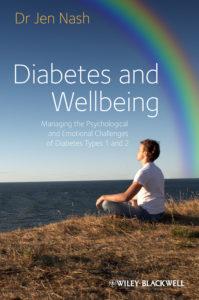
 Having been diagnosed with Type 1 in 19xx, Nash graduated with a degree in Psychology in 19xx and has since worked as a clinical psychologist with a special interest in diabetes care.
Having been diagnosed with Type 1 in 19xx, Nash graduated with a degree in Psychology in 19xx and has since worked as a clinical psychologist with a special interest in diabetes care.
Her book Diabetes and Wellbeing [full title Diabetes and Wellbeing: Managing the Psychological and Emotional Challenges of Diabetes Types 1 and 2] is Nash’s first book although she has been a contributor to an American compilation edited by Dr Beverly Adler, a US clinical psychologist, called My Sweet Life, which was a collection of stories from women with diabetes, none of whom who let the diagnosis get in their way.
Her own book is a distillation of her experience so far, not just her own personal journey with diabetes, but of her experience working in hospital settings. It was there that she could see the emotional factors that can get in the way of factors such as the uptake of clinical advice in terms of medication and behaviours. She says, “People may say use financial reasons for not coming, saying ‘I can’t take the time off work’ to attend appointments, but they are unaware of the realities. People do not know their rights! Your employer has to give you time to visit your doctor if you are living with a long-term condition. You shouldn’t necessarily have to take your annual leave to attend appointments.”
It took Nash about a year to write then go through the process of it being published. She admits that while she is still quite young, and has had a relatively short career in the NHS, much of her experience has been achieved through freelance work and private healthcare consultations. She says, “With diabetes there is a lot of anxiety associated with living with the condition, but there is not space in the traditional settings to air these worries. Sometimes the behaviours can include everything from missing health appointments to just not sticking to taking the medication, or not taking enough care on carb counting, and so on.”
Although living with Type 1 diabetes, Nash doesn’t specialise in T1 care but looks at both types in the clinical setting. She says, There are many overlays between Type 1 and Type 2 diabetes although they are different conditions. Often the problem with Type 2 diabetics is that they don’t comply. There are too few public health messages about our emotional relationship with food. It’s not just about give-a-day or diet sheets. Type 2 diabetes has been called the silent assassin. With Type 1 diabetes there is no hiding from it. With Type 2 people think that if they take a few tablets it will go away. Because it is currently treated in primary care (GPs surgeries) I think that diagnosis is not given psychological back up, yet it is needed there at the start in order to help people deal with the condition in the long run.”
Nash’s belief is that people need space to talk about their personal narrative and integrate the diagnosis into their identity. However, her book is partly aimed at clinicians and other healthcare professionals. “They need feedback and back up too,” says Nash, “They may be brilliant nurses but they need empowerment. As a psychologist, I am very familiar with working with patients, but doctors and nurses are involved in diabetes care too. There is a practical aspect of behavioural change that involves both parties. At an NHS appointment it can feel that it’s often just numbers and HbA1c levels. It can be hard for professionals to work with the emotional side of living with diabetes because it’s actually involves the patient’s whole life, not just their diabetes as a separately entity. So clearly HCPs are in partnership with the patient.”
Nash has lived with Type 1 diabetes for a fair while but has a very practical approach to life, which she shares in the book. One of the chapters is on managing fear, anxiety and worry where she talks quite amiably about why people worry about hypoglycaemia, particularly when in most cases it can be treated with relative speed and ease by consuming a sugary drink or snack. But coming at it from the inside, having experienced hypos and living with the ever-present possibility of having one if things go out of control, she says that while it’s easy to treat one, the affects of a hypo can be frightening, embarrassing, uncomfortable, unpleasant or in an absolutely worst-case scenario they can be fatal, so you’re going to need ways of dealing with them beyond just treating on with sugar when you do go hypo. [see extracts from book on p. x]
Looking ahead
Nash herself is not on a pump yet, but she is on the ‘pathway’ (the term now being used for people heading towards pump funding). She says that even for her, funding is hard and that’s despite her present role with the NHS as part of the Diabetes Wellbeing Service, a full-time project looking at poorly controlled Type 1s and Type 2s and what psychological intervention can contribute to diabetes control, with proof from HbA1c statistics. Nash is delighted to report that the study has given clinically significant HbA1c results. Other than the cost of the psychological support there is no additional prescription costs. “It is not just clinical,” she says, “The health outcomes can be improved which brings much needed confidence for the patient, and it happens to save the NHS money too. Better control means people with diabetes do not end up developing complications and needing medical intervention further town the line.”
In the future she hopes to be able to mix NHS work with freelance work. “The last few years has been exciting while I’ve been training nurses and healthcare professionals. I’ve loved that. I have a dream that psychology gets as embedded in multidisciplinary care as the diabetes specialist nurse. People, both inside and outside of the NHS seem to think that health psychology is an expensive resource, but with just six sessions people are equipped with skills for life. NHS commissioners need to understand this.”
This news item first appeared in our free-to-receive online magazine. Go to the top of this page to sign up – we just need your email address.



